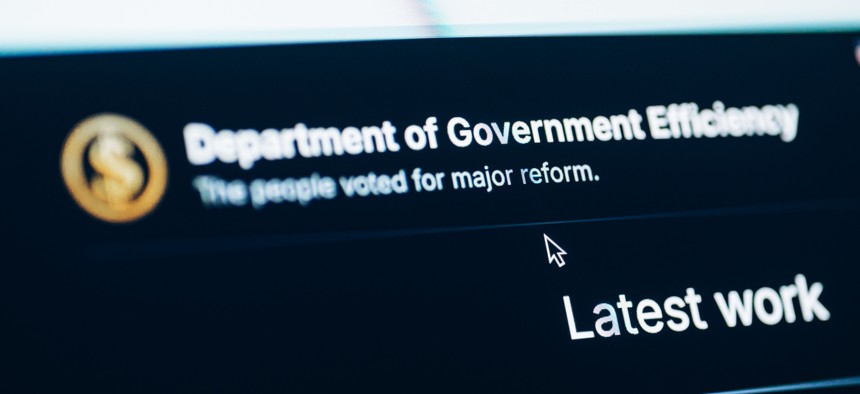
In a 2-1 decision, the appeals court rejected that argument, saying the plaintiffs likely lacked standing to sue, in part because their privacy was not breached in violation of federal law. MarioGuti / Getty Images
DOGE can maintain access to federal personnel data, court rules
The DOGE affiliates will also keep unfettered access to federal education and taxpayer information.
The Department of Government Efficiency and affiliated staff can maintain their access to federal employees' personal information and files, an appeal court has ruled, ensuring the group can tap into a variety of databases and systems maintained by the federal government.
In addition to the Office of Personnel Management's systems, the court allowed DOGE to have continued access to those maintained by the departments of Treasury and Education. A panel of the U.S. Court of Appeals for the Fourth Circuit overturned a lower court’s injunction that initially blocked DOGE’s access.
Individuals associated with DOGE, many of whom have now embedded within agencies, were improperly empowered to probe OPM systems including those used for federal job postings and applications, onboarding, performance management and electronic personnel files, federal employee unions and other groups that brought the case had argued. Those platforms contain the personally identifiable information of millions of current employees, former civil servants and federal job applicants, as well as disciplinary and other personnel information of federal workers.
In a 2-1 decision, the appeals court rejected that argument, saying the plaintiffs likely lacked standing to sue, in part because their privacy was not breached in violation of federal law.
“Prying eyes and probing fingers can be as disquieting when aimed at one’s private affairs as when aimed at one’s private bedroom,” said Judge Jay Richardson, a President Trump appointee, in the majority opinion with Judge G. Steven Agee, a President George W. Bush appointee. “But in those situations, it is not the information obtained, but the knowledge that a third party is engaged in targeted snooping, that causes the harm…That sort of harm is not present here.”
The DOGE employees, he added, were tasked with a “broad and open-ended duty” to improve efficiency and IT across government. The judge also noted the Supreme Court in a similar case related to the Social Security Administration ruled in a manner allowing DOGE to access the agency’s data.
“The DOGE affiliates at Education, OPM, and Treasury would seem hard-pressed to know what needs improvement at their respective agencies before getting a lay of the land,” Richardson wrote. “To insist that the DOGE affiliates explain in advance the exact information they need and why is to demand something just short of clairvoyance.”
Tuesday’s decision will maintain the status quo, as the appeals court had already paused the lower court’s injunction in April. At Education, DOGE staff can read into platforms that contain federal student loan and other data, while at Treasury they can access IRS systems containing all taxpayer information.
DOGE maintains a presence at the Office of Management and Budget, but mostly its staff have dispersed as political appointees of individual agencies.
Alexandra Reeve Givens, CEO of the Center for Democracy and Technology, said the decision undermines the nation’s “bedrock values” related to privacy.
“These events are part of a disturbing effort by the federal government to amass information about people and overturn longstanding privacy norms under the guise of fighting fraud, waste, and abuse,” Givens said. “Now, the courts are giving this administration the greenlight to continue playing fast and loose with all of our most sensitive information."
Share your news tips with us:
Eric Katz: ekatz@govexec.com, Signal: erickatz.28
NEXT STORY: Trump taps economist from the Heritage Foundation to head the Bureau of Labor Statistics







